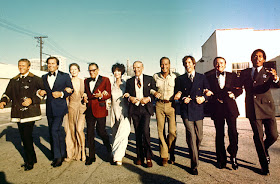The world's tallest building, the Glass Tower, is having its public dedication in scenic San Francisco. The ribbon will be cut, and a few hundred people will head up to the 138th floor penthouse for a fancy party with tuxedos, slinky dresses, and (probably) cocktail shrimp. During a routine systems check before the dedication, one of the electrical boxes on the 81st floor starts a small fire. The sprinklers don't go off and the fire alarm doesn't sound, though. For the dedication, they turn on every light in the building to show off just how tall and bright it can be; that turns out to be a bad idea with an electrical system that is already having problems, and things get worse from here on in. Power malfunctions and skimping on building materials lead to the warning systems going off far too late, and pretty soon there is an inferno working its way up to the party on the 138th floor.
 |
| Aren't they a little too happy for a disaster flick? |
The rest of the cast has much smaller and less important roles, but many of the actors are instantly recognizable. Faye Dunaway is Newman's love interest, and the pair are pretty together. O.J. Simpson is a security guard who saves a cat. Fred Astaire plays an ineffective con man, earning a "you've been overlooked for your whole career, so here's acknowledgment for a far lesser role" Academy Award nomination. Jennifer Jones made her last film appearance here, and it is fairly memorable, if only for her final scene. Robert Wagner has a small role as the idiot who turned on all the lights, because the city of San Francisco is going to ooh and ahh over a building with electric lights like it's a 138-story Christmas tree. Stupid. Robert Vaughn, who I always seem to catch in roles where he plays a jerk, was surprisingly likable as a US Senator (the political kind, not the sports kind). Mike "Bobby Brady" Lookinland has a small part as a Bobby Brady-age kid. No, he doesn't die. Oh, and you might recognize Susan Flannery as a soap opera actress. Or not.
But, like I said earlier, the cast is largely inconsequential next to the spectacle of this fire. Without CGI to enhance it, I was a little skeptical as to how good this disaster would look, but I needn't have worried. They did this the old-fashioned way, through misdirection and real fire. I thought the movie looked great, especially for one made forty years ago. There is a lot of smoke, a lot of debris, and (of course) a lot of fire. What I liked about this fire is that it was obviously dangerous from a very early point. While the fire started at the thirteen-minute mark, it didn't kill anyone for another forty-five minutes; the characters that died were, surprisingly, not just some random scrubs, but a recognizable actor with a subplot in full swing. So, the fire is apparent early in the film --- which is important in a movie that clocks in at over 160 minutes --- and deadly to characters that you expect to hang around a while. That's awesome! Fire is so rarely shown as dangerous in films (it's more of a cool backdrop most of the time) that this approach feels almost novel. Pair the dangerousness of the fire with the old-school special effects that actually used fire (and lots and lots of smoke), and this is a pretty believable disaster. And that's the whole point.
 |
| Check, please! |
On a quick side note, am I the only person who finds it hard to believe that Maureen McGovern's song, "We May Never Love Like This Again" A) is the theme to a disaster movie B) was performed by her, in a scene, and yet we never see her character's ultimate fate and/or C) won an Academy Award? Man, the seventies were a strange time.
On the other hand, I like when big things go boom. While this isn't a flawless movie, it is pretty entertaining, despite a long run-time. For the most part, I think the movie is surprisingly plausible (except for that stupid helicopter explosion), which is a nice change of pace for a disaster flick. Newman was good, McQueen was above average, and the largely recognizable cast made for some unexpected fodder for the flames. I would have liked it better if Newman and McQueen weren't such know-it-alls, but it is kind of nice to have a disaster with obviously culpable parties.

No comments:
Post a Comment